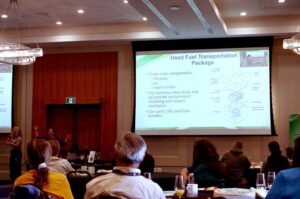Anishinabek leaders raise concerns over nuclear waste

By Rick Garrick
THUNDER BAY — Fort William Chief Michele Solomon and Netmizaaggamig Nishnaabeg Chief Louis Kwissiwa were among those who raised concerns during the Assembly of First Nation’s A Dialogue on the Transportation and Storage of Used Nuclear Fuel. Held on May 22 at Delta Hotels Thunder Bay, the dialogue featured two presentations — Adaptive Phase Management and Deep Geological Repository, and Transportation of Nuclear Waste — as well as Dialogue and Breakout Sessions. The AFN previously had two dialogues scheduled in Fredericton, N.B. and Toronto and another scheduled in Vancouver on June 3.
“Fort William First Nation has openly opposed the nuclear waste being transported through our homelands and we’ve been very open about that,” says Fort William Chief Michele Solomon, noting it was disappointing to hear a “one-sided position on this matter” by Nuclear Waste Management Organization (NWMO) during the meeting. “It’s time that we hear from experts that are not here to benefit from it and that can provide us with that objective research and objective information.”
Chief Solomon says she never heard any support from the people who asked questions during the meeting.
“There’s a lot of concern for how this will have impact on future generations and the potential for risks when transporting this radioactive material,” Chief Solomon says. “There’s a lot of knowledgeable people here and they have raised those questions on [how NWMO] says they are testing but it is not at full scale, so if it is not being tested at full scale, then with what degree of certainty can you say it minimizes the risk or there is very low risk? That’s why I say we need to hear from people who are not invested, people that don’t have such an economic interest in it.”
Kwissiwa says Netmizaaggamig Nishnaabeg is unceded and un-surrendered territory.
“So the lake that Hwy. 17 runs over — White Lake, (its) traditional name is Netmizaaggamig — that’s our homeland, it’s un-surrendered, unceded,” Chief Kwissiwa says. “Canada has no jurisdiction, NWMO has no jurisdiction there, you need our permission to cross nuclear waste there. And same goes with CP Rail, that’s right on reserve lands, too. Again, un-surrendered, unceded, that’s right beside White Lake, it runs parallel, there’s even a portion where the train runs over White Lake, too, so that’s too much risk for us. It’s too much risk for the fish, it’s too much risk for the animals, it’s too much risk for our people — that’s our livelihood so we will never allow it passing our territory.”
Chief Kwissiwa says accidents have occurred on Hwy. 17 at White Lake in the past.
“If some of that nuclear waste gets into White Lake, that’s it, our people are doomed because that’s the lifeline of our people,” Chief Kwissiwa says. “That’s our food sanctuary and we’ll do anything to protect our sovereignty. There’s fish there, there’s all kinds of medicines in that water and that’s the last thing we want…Why risk it? There’s too much pristine land up here and we’ve got ecosystems up here. There shouldn’t be any risk and if there’s anything we can do about it, we will not allow that risk.”
Joe Heil, director for Indigenous engagement for Northern Ontario at NWMO and one of the presenters, says they were supporting the AFN in its dialogue with people across the country by providing their perspective on the issue.
“We do have nuclear waste, it is a reality,” Heil says. “We’ve been running reactors since 1962 and it’s a problem, we’ve pushed off that problem and we don’t want to push it on to future generations so we want to do something now about it. It is currently handled very safely right now, it is currently stored at all of the facilities and we’re looking to take something that is stored very safely and store it even that much more safely.”
Heil says the NWMO is currently doing a site selection process with two areas, the Wabigoon Lake Ojibway Nation-Ignace area in northwestern Ontario and the Saugeen Ojibway Nation-South Bruce area in southern Ontario.
“We’re hoping to this year pick between the two sites, either north or south, and then immediately after that, enter into what we call the regulatory process in which we will go through an impact assessment,” Heil says. “Our process again I think fits nicely within this concept of Free, Prior and Informed Consent — we don’t even have a project yet and we’re already having this dialogue. We fund all these things to make sure there is no cost to the communities, and of particular note, we’ve actually given both Saugeen [and] Wabigoon letters saying we will not move forward without their support, essentially a veto.”
Heil says the containers for the transportation of the nuclear waste would be designed to withstand any foreseeable accidents.
“And even in the extremely unlikely event that there was to be a tip over of this particular fuel, it’s a solid,” Heil says. “It’s really a simple fact of picking it up and putting it into another container, it’s not going to ooze all over the road. You can find all those things with a Geiger counter, so it can be cleaned up pretty good.”
Heil adds that all kinds of radioactive materials are already being transported across the country, including yellowcake, a uranium concentrate product. Yellowcake is further processed into uranium dioxide for use in CANDU reactors or uranium hexafluoride, the feedstock for enriched light water reactor fuel.


